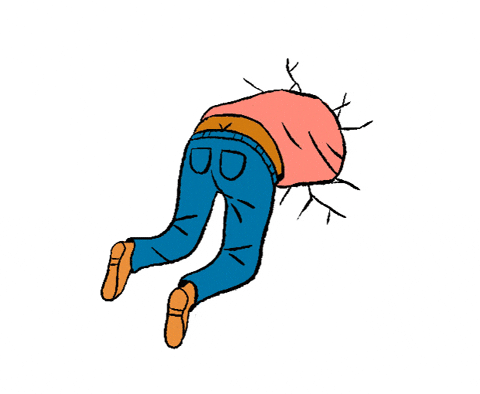There should be nothing that makes you feel stuck, and it’s: every day. Stick to the rules, three points line, every day you are in the same circle of continuous circulation. No stimulation, no freshness. All are predictable!
The wheels are still turning, but you can’t move forward to your goals in life. It’s like the whole world revolves around you and you’re stuck in place. The more you want to go out, the more you feel trapped. Then, you feel very tired, very tired!
However, we all get into trouble from time to time. In our life path, there will always be a surprise or challenge, so we left the original road, into a ditch.
Whether you’re feeling stuck, powerless, or depressed in a pattern, we all need to get out of the mud and regain our momentum.
Today we share 5 simple and effective ways to examine how to move forward when you feel stuck.
1. Mobilize your body
Every time we turn the wheels and don’t move forward, it means that we’re stuck in our heads thinking about what we’re going to do, not sitting in a vehicle that can do it.
Physiologically, exercise can increase the brain’s ability to produce dopamine. This neurotransmitter helps us feel motivated and act in our lives. It also helps stimulate the brain waves, making people less anxious and more relaxed. This allows us to think creatively and come up with new solutions.
So, when you feel sleepy at home, stop thinking too much and start moving your body. For example, you can choose to go to the gym, do a few push-ups, take a walk nearby, or even dance in the living room.
Work is important but not keep working and working.

A little exercise in your body can help you get out of trouble and start doing something meaningful again.
2. Say it or write it out
When we can’t take another step forward, we often cycle the same idea over and over again. But breaking this cycle can be challenging because we can’t even see that we’ve entered a cycle.
Once we say these words out loud to friends, therapists, or coaches, or write them down on a piece of paper from your mind, we can separate from these ideas and begin to identify the patterns that get us into trouble.
Often, simply hearing what you say or seeing them in our diary can help us think about our situation from a new perspective. The added benefit of talking to another person (the person we trust) is that we can also hear their feedback or suggestions.
3. Start with a simple step
A lot of times, taking any action can make you feel stressed. Most of our daily activities are made up of a whole bunch of actions that we combine. When we try to get rid of the routine and get exhausted, we don’t have any extra energy.
For example, the morning “preparation” sounds simple, but it contains a long list of actions. After all, you need to get up, bathe, brush your teeth, dress up.
All of this can be unbearable when you’re sticking to the rules, so start with the simplest steps! Just get out of bed and you can be proud – it doesn’t force you to do the other things on the list right away.
Like a book, it’s written in one word at a time, and you just need to transition to the next word. movement, accompanied by a small movement, and then the next one. Large projects are also done one small action after another.
Then, celebrate every little step you’ve completed. You don’t need to focus on everything. Instead, you have to take the most direct steps that can help you get back on your toes.
4. Try new things
The problem with staying where it is is that we know its results.
Continuing to perform the same activity in a loop does not change this.
So, when you’re stuck, try something new. It doesn’t need to make any sense, or even seem to have a direct relationship with something. It can be as simple as greeting strangers every day, changing a new hairstyle, or changing our morning habits.
The fact that we choose to try something is much more important than the fact that we are willing to change things.
Although we cannot move forward. But if we’re willing to try a new strategy and experiment like a scientist, it’s easy to figure out what motivates us to move forward.
A lot of times, a big life change comes with it.
5. Get a lot of support
Getting into trouble can make us lie to ourselves that we’re doing nothing because we can’t see the outside movement. In fact, turning our wheels is a physically and mentally exhausting process.
To get out of this mess, we need to get all kinds of support from others. The best can come from friends, colleagues and family who care you most. We can contact them by messages or chat in an emergency. Or consult a consultant who can help you with nutrition, exercise, essential oils, bathing, massages, herbs, medications, etc.

Don’t just keep it yourself. Give others chance to support you.
Few people can walk out of the ditch on their own. It is therefore no shame to accept any support necessary to get rid of this trap. In fact, it’s the only way to get you free.
As Jim Rohn said “You are the average of the 5 people you spend the most time with.” If you are spending a lot of time with people who are unmotivated, also stuck, or have very different ideals to yours, you are likely to end up feeling more stuck. (theawarenesscentre.com)
Conclusion
We may find ourselves ceded at one point or another. Sometimes this only lasts for a short period of time; In any case, remember that having simple and useful tools to help us get back on the road to openness is critical.

![how to move forward when you feel stuck [simple ways in life]](https://gosetmind.com/wp-content/uploads/2020/09/xUyleSUfFUIL78pHJgrZ0.png,qc4a643,ac4a643.pagespeed.ic.X6fR-zMgtr.jpg)

![How to distract your thoughts [AND calm your mind]](https://gosetmind.com/wp-content/uploads/2020/10/mPB3T7iMylweIVT20Hbu-440x264.png?c4a643&c4a643)


